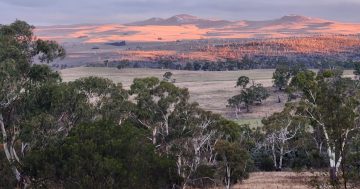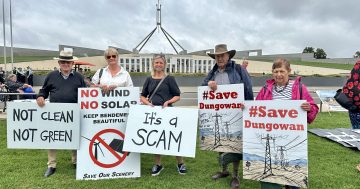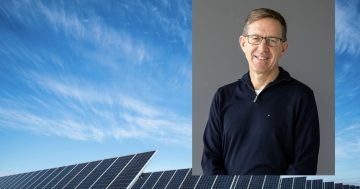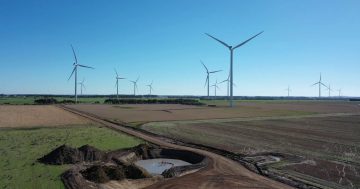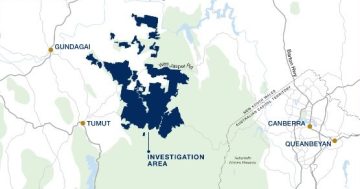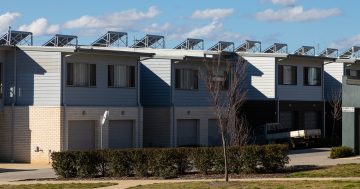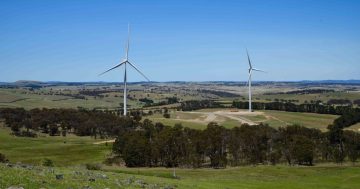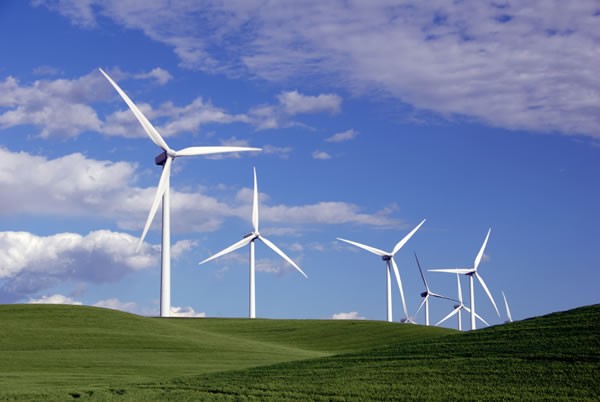
Wind farms can be a valuable source of farm income. Photo: File
This week, a small-ish group of protesters converged on Parliament House. They were an interesting bunch.
Some were farmers who don’t believe in renewable energy and net zero policies. The sovereign citizen lot was there, and the now infamous “cookers” – the Convoy to Canberra anti-vaccine protestors who lodged in the national capital like a particularly determined burrowing tick during the pandemic.
I scratched my head at the alliance – because I am a farmer, too, part of an active family farming partnership. I’m also the mother, sister, wife, daughter, cousin and neighbour of many other farmers.
I’m not talking about a recently acquired hobby block, either. Our farm grows sheep and cattle and wheat and canola. We have fed and clothed the nation for around 170 years, in the same family hands, on some of the most productive country in Australia.
And like many other landholders across Australia, we’re completely fine about renewable energy, including wind farms.
Here’s the thing about wind turbines: they’re best sited on steep rocky hilltops where there’s a lot of wind. You can’t grow crops on steep rocky hillsides. It’s hard to even drive up them, much less run a tractor on a 30-degree slope.
Fortunately, sheep don’t appear to have ideological objections to eating grass around the bottom of the turbines. Individual farmers receiving $40,000 per annum per turbine are also usually pretty comfortable about the situation.
At Boorowa, the Bango wind farm, owned by Squadron Energy, is the result of 15 years of planning and consultation with nine local farmers.
During construction, the project supported more than 320 jobs, including 190 locals. It injected $190 million into the regional economy, with $3.9 million contributing to community projects and initiatives in the Yass and Hilltops shires over its life.
Other rural landholders are angry about poorly sited renewable projects like the one south of Cooma, where community members are fighting to protect the landmark Three Brothers hills from the Coonerang wind farm project.
The Real Monaro website is instructive: “REAL Monaro supports the important role renewable energy is already playing in the shift to a carbon neutral economy, and believes that the Monaro needs to play its part in this shift.
“We want your support to encourage the protection of significant landscape features of the Monaro and a list of ‘no go’ areas established.
“We want the uniqueness of the Monaro to be preserved for future generations while we address climate change. With proper planning, community consultation and cooperation, we can achieve both.”
And there you have it: the problem is mostly not renewable energy per se, it’s putting infrastructure in the wrong place.
Over many long years covering these issues as a journalist, I’ve observed a clear difference between renewable companies and the outcomes they achieve.
Some engage strongly with regional communities. They fund local events, provide jobs, engage local contractors and give back to the community. They consult and commit. These projects usually proceed without too many issues.
Conversely, other companies acquire sites without community consultation, import equipment and labour and alienate many who see no benefits. Those projects are often vociferously opposed.
But let’s be clear about this: it’s not because farmers, in general, oppose renewable energy. It’s mostly because the process is wrong.
In the Bega Valley, council and the Clean Energy for Eternity not-for-profit organisation (CEFE) signed an MOU to construct the Tathra Community Solar Farm.
Through organising events and broader community engagement, CEFE has raised money for everything from RFS fire sheds, community halls, churches, surf clubs, preschools and a tourist venue to install solar panels.
The Community Solar Farm project opened in 2015. It captures financial savings and reinvests these in other local solar projects across the Bega Valley. Everyone is a winner, including the planet.
I’ve always been annoyed by the simplistic view many take of farmers, as if we were a single mob of neck-scratching hicks, either striding romantically through wind-tossed paddocks on Farmer Wants a Wife or objecting to daylight saving because it will upset the milking cows and fade the curtains.
Farmers have multiple opinions, multiple ideas and multiple political beliefs. Many are well educated, well travelled, and well and truly capable of critical thinking about the national energy transition.
I don’t know who that mob were at parliament, but like the next-door neighbour’s lice-ridden sheep, I’d steer clear of them in case it’s infectious.












